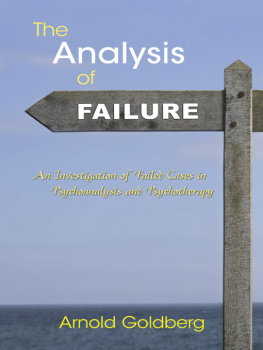First published 2008 by Paradigm Publishers
Published 2016 by Routledge
2 Park Square, Milton Park, Abingdon, Oxon OX14 4RN
711 Third Avenue, New York, NY 10017, USA
Routledge is an imprint of the Taylor & Francis Group, an informa business
Copyright 2008, Taylor & Francis.
All rights reserved. No part of this book may be reprinted or reproduced or utilised in any form or by any electronic, mechanical, or other means, now known or hereafter invented, including photocopying and recording, or in any information storage or retrieval system, without permission in writing from the publishers.
Notice:
Product or corporate names may be trademarks or registered trademarks, and are used only for identification and explanation without intent to infringe.
A CIP record for this title is available from the Library of Congress.
Designed and typeset by Straight Creek Bookmakers.
ISBN 13: 978-1-59451-526-2 (hbk)
ISBN 13: 978-1-59451-527-9 (pbk)
This book is a study of colossal failures in particular control attempts by Herbert Hoover, Franklin Roosevelt, Richard Nixon, Maximilien Robespierre, Leon Trotsky, Ernesto Che Guevara, Julius Caesar, Adolph Hitler, the prosecutors of O. J. Simpson, the proponents and opponents of the accepted theory about AIDS, and American officials who might have prevented 9/11. Why consider those failures and why characterize them as having been colossal? Because the attempts were major events in human history, and some were literally fatal for the attempter. But why study them at all? The question could reflect the belief that control failures are rare. To the contrary, control failures have been pivotal events in human history, and they permeate everyday life. Yet the causes of colossal failures in the control attempts of the famous are essentially no different from quotidian failures. So if you have recently blown one because you took on too much, take comfort in that Robespierre did the same in the French Revolution.
The foregoing does not reveal what the reader deserves to know (unfortunately). You are reading the prose of a failed sociologist. Given the fields reputation, that confession is hardly the kiss of death. In any case, the label failed sociologist is apt because I have been unable to convince my colleagues (read a control failure) that the notion of control could be central for their field andat the risk of irritating anthropologists, economists, political scientists, and psychologistscentral for other fields. History is an exception? Not at all, because any human event or episode can be interpreted as a control attempt or a consequence (anticipated or unanticipated) of one or more control attempts.
Whatever the scientific or scholarly field, a central notion is a notion that can be used to describe and think about the fields putative subject matter. To be sure, any thing or event can be described and/or thought about in various ways, but a central notion forces an exclusive focus on certain characteristics (attributes or properties) of things or events, whether particular ones or entire categories. Thus, if control is taken as the central notion, then innumerable characteristics of Adolph Hitler (e.g., his weight, birthplace, and interest in architecture) can be ignored when attempting to explain the failure of the German invasion of the Soviet Union. Indeed, Hitler himself is not relevant unless one recognizes that he controlled the invasion in the sense of having ordered it. Of course, whatever the question about Hitleranyone or anything, for that matterall manner of characteristics are bound to be ignored when seeking an answer; but a central notion provides a reflective criterion of relevance.
A central notion is no less a relevance criterion when seeking an explanation of a class of events or things. Whatever the designation of that explanationa theory, a principle, or a simple causal assertionit rests on the assumption that the events or things of the class share at least one crucial characteristic, something that makes all of them amendable to the same explanation. Of course, what they do or do not share depends entirely on the way that the class has been defined, and the definition is likely to reflect what is a central notion for the definer. But no matter how a class is defined, its members (particular events or things) are bound to differ in various ways, and a central notion can be the rationale for ignoring many characteristics. Consider Hitlers order to invade the Soviet Union and John Browns attempt to seize the arsenal at Harpers Ferry. Would it be ridiculous to contemplate an explanation that applies to both failures? Surely they differed in uncountable ways; but just as surely they were both attempts at coercive control, and in that light a multitude of differences (e.g., their artistic talents) are of questionable relevance for both descriptive and explanatory purposes. However, the utility of control as a central notion is diminished unless conceptualized, as in , so as to at least identify relevant differences or similarities among the events or things in question.
Complexities commence with recognition that the relevance of any difference or similarity is largely if not entirely a matter of the question asked, and a central notion should promote the pursuit of distinct questions. Thus, it is one thing to ask why Hitler and Brown undertook their attempts at coercive control, but quite another to ask why both failed. identifies three dimensions of any partys control attempts that could be relevant in explaining a particular failure. Defining the dimensions all too briefly, scope pertains to the characteristics of targets (in the case of controlling human behavior, the targets voting preference is a possible characteristic) that the party has attempted to control in the past; diversity relates to the kinds of control attempt (e.g., coercion, begging, commanding) that the party has engaged in; and range is the number and variety of past control targets. Those three dimensions enter into the general control principle (GCP): An expansion of the diversity, range, and/or scope of control attempts increases the probability of a control failure.
The GCP is defended at length in Nonetheless, the all too brief illustration hopefully clarifies what is meant by describing and thinking in terms of a central notion.
The foregoing claims about a central notion should interest or challenge readers who are aware, however dimly, of fragmentation in the social and behavioral sciences, sociology especially. Granted, given the numerous ideologues that haunt sociology, it is questionable to suggest that the field is a science. Be that as it may, any scientific or scholarly field needs a central notion to reduce fragmentation.
Think of physics without the notion of force, economics without utility, or anthropology without culture. In the case of sociology various notionsinteraction, inequality, and conflict, to mention only threeare central notion candidates. Whatever the candidates, the claim is that a fields fragmentation can be checked most effectively by a central notion; otherwise, the initial contentioncontrol could be the central notion of the social and behavioral sciencesbecomes moot.









